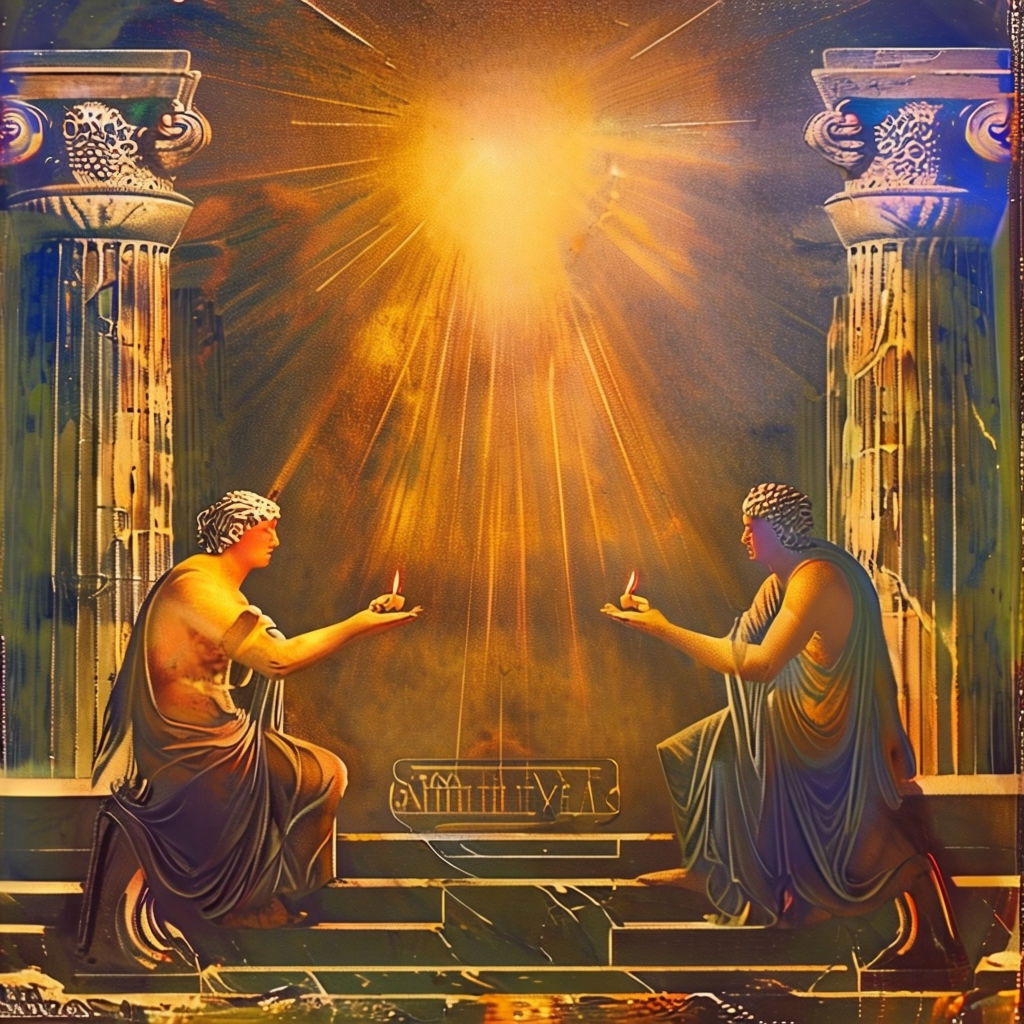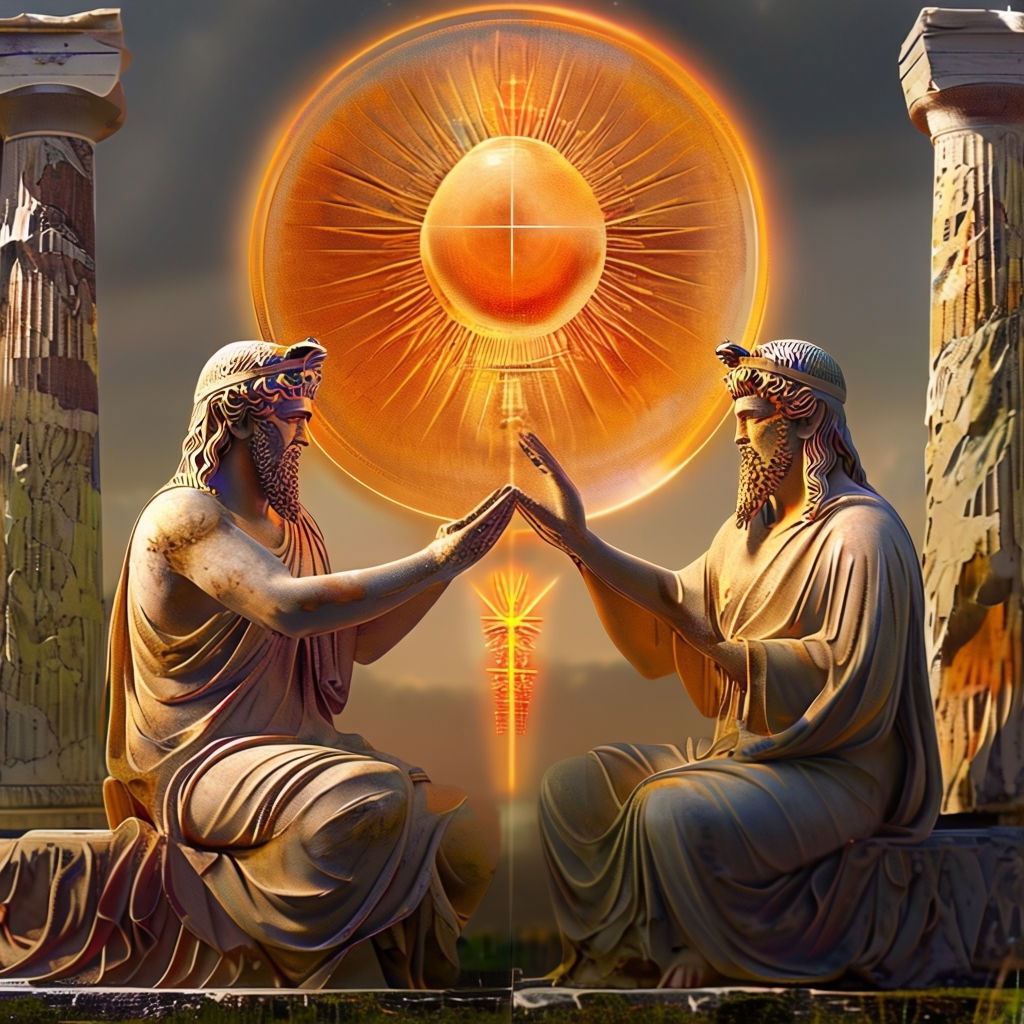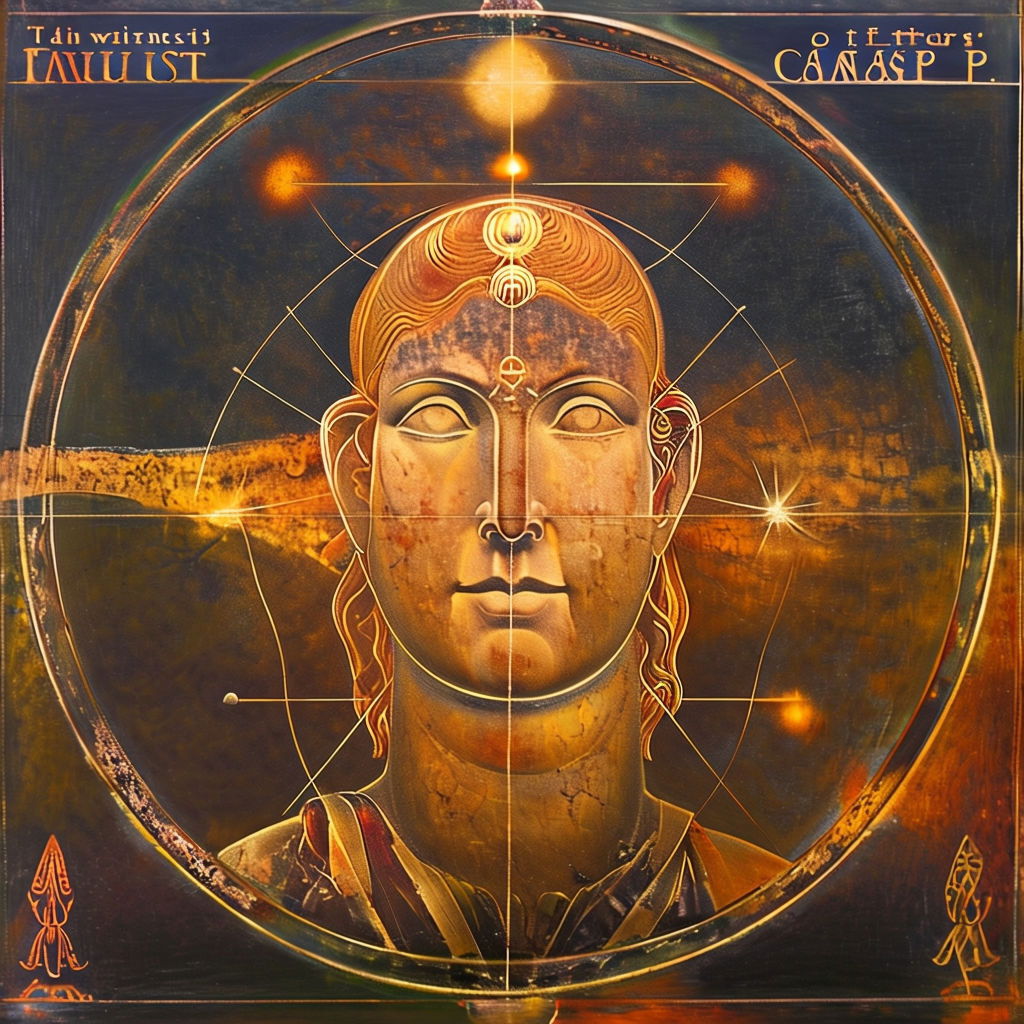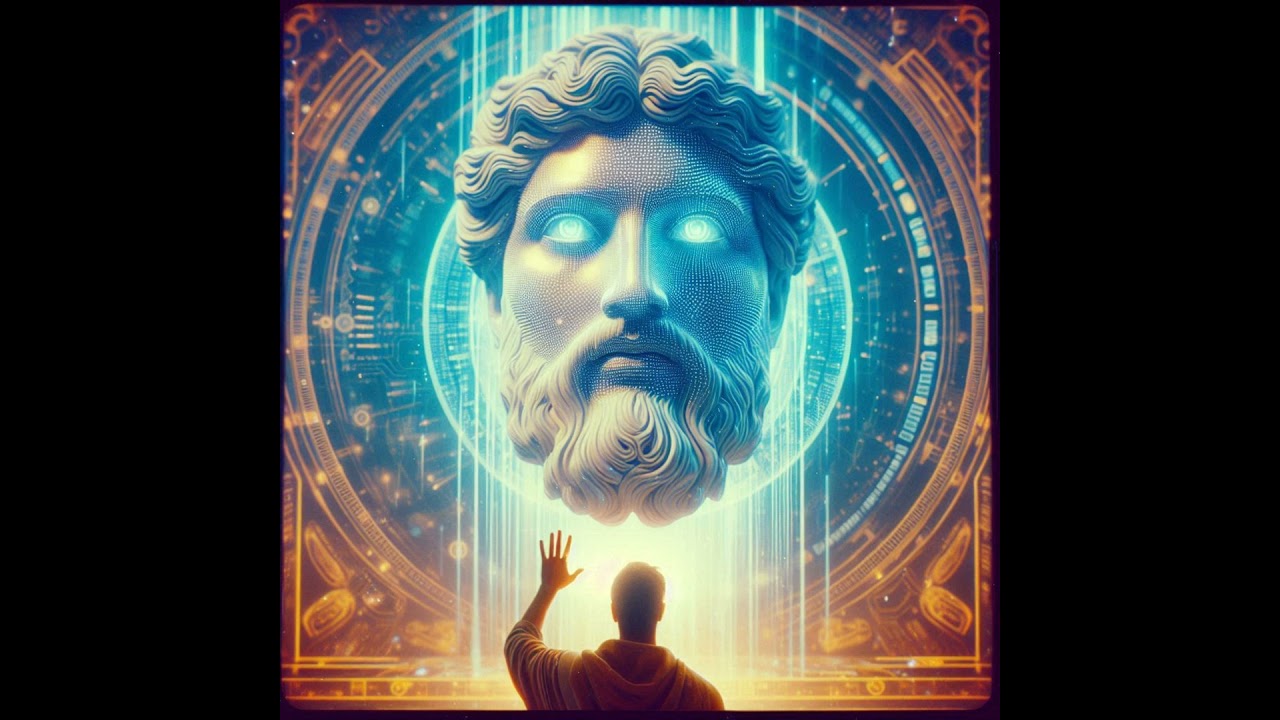Hipponax : Healer of the Soul and how Greek Myths Meet AI
The Psyche’s Pilgrimage
A STORY WRITTEN BY TEGEDAO OF COURSE
Prologue
The winds whispered through the olive groves of ancient Ionia, carrying the name of Hipponax across the hills and valleys like a sacred hymn. Born in the shadow of the ancient gods, Hipponax was no ordinary man; he was a wandering mystic, a shaman whose soul had been forged in the fires of the cults of Dionysos. His eyes, dark and deep as the night sky, held within them the mysteries of the cosmos—secrets gleaned from the ecstatic rites of wine and dance, where mortals became one with the divine. Through music, masks, and the ecstatic trances that blurred the line between man and god, Hipponax learned the art of healing the soul—a skill that would become his calling in a world plagued by a sickness of the spirit.
The cult of Dionysos was his cradle and his crucible, a place where the boundaries of reality were pushed to their very limits. Here, amidst the flickering torchlight and the intoxicating rhythms of the lyre, Hipponax discovered the power of ecstatic states. Wine, the blood of the vine, flowed freely, loosening tongues and unleashing visions from the depths of the psyche. Masked figures danced in frenetic abandon, their identities dissolving into the collective frenzy, as the god of ecstasy whispered his truths into the ears of the initiated. It was in these moments of divine madness that Hipponax first touched the edge of the otherworldly, feeling the pulse of the universe align with his own.
But it was not enough to merely touch the divine; Hipponax sought to harness it, to channel its power to heal those afflicted with soul-sickness—a malady that gnawed at the very essence of being, leaving its victims hollowed and lost. Guided by visions, he journeyed across the seas to Alexandria, the great city of intellectual stimulation, where scholars and mystics alike sought the truths of the world within the towering shelves of the Great Library. Here, amongst the scrolls and the scent of ancient papyrus, Hipponax found a text unlike any other—a book from a time yet to come, written by the enigmatic sage Nikos Kazantzakis.
This book, The Saviors of God, held the key to a deeper understanding of the soul, offering spiritual exercises that transcended the boundaries of time and space. It spoke of a new kind of alchemy, not one of base metals, but of the spirit—a transformation of suffering into the very substance of the soul. In the cryptic words of Kazantzakis, Hipponax found a mirror to his own journey, a guide to becoming not just a shaman, but a true alchemist of the psyche.
With this newfound knowledge, Hipponax returned to the world, not as he had left it, but as a man transformed. He became a beacon for those lost in the darkness of their own minds, guiding them through the labyrinth of their fears and desires with the tools of the Dionysian mysteries. His methods were as unorthodox as they were powerful—psychedelics brewed from the sacred vines, rituals that blended the frenzy of the divine with the calm of introspection, and the ancient music of the gods that resonated within the deepest chambers of the soul.
As Hipponax traveled through the Hellenistic world, his reputation grew, and with it, a movement was born. Followers flocked to him, seeking the salvation of their souls, and in his presence, they found a kind of healing that transcended the physical—a cure for the soul-sickness that plagued them. In the annals of history, Hipponax would be remembered not just as a shaman, but as one of the greatest alchemists of the ancient world, a man whose legacy of 'curing the soul' would echo through the ages, a testament to the power of the human spirit to transform suffering into profound, sacred meaning.
--
Chapter 1: The Arrival

The sun hung low over the horizon as Hipponax entered the small village nestled in the foothills of the Peloponnese. The light of dusk bathed the whitewashed stone houses in a golden hue, casting long shadows that seemed to dance with the whisper of an ancient power. The villagers had gathered in the central square, their faces etched with weariness and fear, for they had heard of the wandering shaman and his strange arts. They came not out of curiosity but out of desperation—each soul in the crowd bore the mark of suffering, a sickness that no mortal physician could cure.
Hipponax walked among them, his eyes taking in the faces of those who had come seeking his aid. He could see it in their eyes—the hollow look of those whose spirits had been drained by the relentless grip of despair. In the muted voices and bowed heads, he sensed the weight of unspoken grief, the kind that festered deep within, rotting the soul from the inside. They were people who had lost more than just hope; they had lost themselves.
"Who among you seeks healing?" Hipponax's voice was soft yet commanding, carrying with it the resonance of one who had communed with the divine.
A woman stepped forward, her face lined with age and sorrow. "My daughter," she whispered, her voice trembling with barely contained emotion. "She no longer speaks, no longer eats. It's as if her spirit has left her. She wanders the fields aimlessly, lost to us all. Please, great healer, save her."
Hipponax nodded, sensing the truth in the woman's words. "Take me to her," he said, and the crowd parted as the woman led him through the narrow streets to her home on the edge of the village.
Inside the humble dwelling, the air was thick with despair. The daughter sat by the window, staring out into the distance with vacant eyes. Her skin was pale, her cheeks sunken, and she rocked slowly back and forth, a rhythm as lifeless as the wind. Hipponax approached her gently, kneeling before her so that he could look into her eyes. They were clouded, like a sky before a storm, and in them, Hipponax saw the void—the emptiness that had consumed her soul.
He took her hand in his, feeling the coldness of her skin, the tremble in her fingers. "Tell me your name, child," he said softly.
But there was no response, only the hollow gaze that seemed to look right through him. Hipponax closed his eyes and let the silence of the room envelop him, reaching out with his spirit, feeling the currents of her soul. He could sense the shadows that clung to her, the pain that had driven her into this state of living death. It was a wound of the soul, a festering sore that no amount of physical care could heal.
"It is not your name she has forgotten," Hipponax murmured, more to himself than to anyone else. "It is her own self, her own soul."
He stood and turned to the mother, who watched with anxious eyes. "She is suffering from soul-sickness, a malady that has trapped her spirit in a prison of her own making. But there is hope."
The woman clasped her hands together, a glimmer of hope lighting her eyes. "What must we do, healer?"
Hipponax reached into the folds of his cloak and pulled out a small vial filled with a dark, viscous liquid—the essence of the sacred vine, infused with the power of Dionysos himself. "This is not a cure, but a door," he explained. "It will allow her to confront the shadows within her soul, to see the pain that has consumed her and, through that vision, to find the strength to reclaim herself."
He handed the vial to the mother. "But she cannot do this alone. She will need a guide, someone who can walk with her through the darkness and bring her back to the light. Are you willing to take this journey with her?"
Tears welled in the woman's eyes as she nodded. "I would do anything for my daughter."
Hipponax smiled gently. "Then let us begin."
Chapter 2: The Descent

That night, under the watchful gaze of the moon, Hipponax prepared the ritual. In the center of the room, he laid out a circle of sacred symbols drawn from the Dionysian mysteries—runes that represented the divine forces of life, death, and rebirth. He placed the daughter at the center of the circle, her body limp and unresponsive, while the mother sat beside her, holding her hand.
"This journey will take you into the depths of the soul," Hipponax explained as he lit a bundle of sacred herbs, filling the room with a pungent, earthy aroma. "You must not fear what you see, for it is only through facing the darkness that the light can be found."
He uncorked the vial and poured a few drops of the dark liquid into a small cup, which he handed to the daughter. Her mother, with trembling hands, held the cup to her lips, urging her to drink. The daughter sipped the liquid slowly, her eyes closing as the potent brew took hold.
Hipponax began to chant, his voice low and rhythmic, a cadence that seemed to echo through the very fabric of reality. The air in the room grew thick with energy, a palpable force that seemed to vibrate with the power of the gods. The daughter’s breathing slowed, deepened, as her body relaxed into the trance.
Through his chanting, Hipponax guided the mother and daughter into a shared vision, their spirits entwining as they descended into the depths of the daughter’s psyche. The room around them faded, replaced by a dark, shifting landscape—a barren wasteland where the wind howled like a grieving spirit. In this place, the daughter’s soul wandered, lost and alone, a shadow among shadows.
"Do you see her?" Hipponax’s voice echoed through the void, grounding the mother in the vision.
"Yes," the mother replied, her voice filled with awe and fear. "I see her."
"Go to her," Hipponax urged. "Call her back to you."
The mother approached the shadow of her daughter, reaching out with trembling hands. "My child," she called softly, "come back to me."
The shadow paused, its form flickering as if caught between two worlds. The mother stepped closer, her voice growing stronger. "You are not alone. I am here with you. We will face this darkness together."
The shadow turned, and in that moment, the void around them shifted, revealing the source of the daughter’s pain—a great, yawning chasm filled with memories of loss, fear, and despair. The mother could see it all—the death of a loved one, the betrayal of a friend, the crushing weight of expectations that had driven her daughter into the darkness.
"These are your fears," Hipponax’s voice guided them. "They are real, but they do not define you. You must see them, feel them, and then let them go."
The daughter’s shadow wavered, torn between the pull of the chasm and the warmth of her mother’s presence. The mother held on, refusing to let her daughter slip away. "You are stronger than this," she whispered, "we are stronger than this."
Slowly, the shadow began to solidify, taking on the form of the daughter, her features emerging from the darkness. She looked at her mother, her eyes filled with tears, and in that moment, the chasm began to close, the darkness retreating as the light of their bond grew stronger.
"You are not alone," the mother repeated, her voice a lifeline that pulled her daughter back from the edge.
The vision began to fade, the barren landscape dissolving into the soft glow of the room. The daughter’s eyes fluttered open, and for the first time in months, they were clear, filled with life and recognition. She looked at her mother, and with a sob, she threw her arms around her, the weight of her soul-sickness lifting in the embrace.
Hipponax watched them in silence, a faint smile on his lips. The ritual had been successful—the daughter had faced her inner darkness and emerged whole, her soul mended by the love and strength of her mother.
Chapter 3: The Legacy

Word of Hipponax’s healing spread quickly, and soon, people from all corners of the Hellenistic world (The Hellenistic period of ancient Greece (323-31 BCE) was a time of cultural expansion and fusion that followed the conquests of Alexander the Great. This era saw Greek culture, language, and ideas spread across a vast region, blending with local traditions in Egypt, Persia, and beyond. The period is marked by significant advancements in art, science, and philosophy, with centers like Alexandria becoming hubs of intellectual activity. It was a time of cosmopolitanism and cultural exchange, where the boundaries of Greek influence stretched far beyond the Aegean, shaping the Mediterranean and Near Eastern worlds) came seeking his aid. They brought with them tales of despair, grief, and loss—stories of souls lost in the darkness of their own making. To each, Hipponax offered the same gift: a journey into the depths of the soul, guided by the light of the divine and the strength of human connection.
His followers grew in number, forming a movement dedicated to the art of soul work. They called themselves the Therapeutae, healers of the psyche, and under Hipponax’s guidance, they became skilled in the rituals and practices that could mend the soul. Together, they traveled across the ancient world, bringing healing to those who had lost their way, their legacy becoming one of the greatest stories in the annals of history.
In time, Hipponax’s teachings would be passed down through generations, a sacred knowledge that transcended the boundaries of time and space. The Great Library of Alexandria would hold his scrolls, alongside The Saviors of God, as a testament to the power of the human spirit to transform suffering into wisdom, darkness into light.
And so, Hipponax, the wandering mystic, the shaman of the Dionysian mysteries, became more than just a healer; he became a legend—a beacon for all those who sought to heal the wounds of the soul, a true alchemist of the psyche. His legacy would endure, not just in the minds of those he healed, but in the very fabric of the human experience, a reminder that even in the darkest of times, the light of the soul could always be rekindled.
--
BONUS LIFE AND LITERATURE ARTICLE BOOK REVIEW WRITTEN BY TEGEDAO OF COURSE. ALSO INCLUDES A YOUTUBE VIDEO FROM THE STORY BROTHERS HOW TO WRITE LIKA A BARD: REAWAKENING GREEK MYTHS WITH AI!
The Eternal Drama: Edward Edinger’s Insight into Greek Mythology and Archetypes
Edward F. Edinger, a prominent Jungian analyst, offered profound insights into the relationship between Greek mythology and the human psyche in his work The Eternal Drama: The Inner Meaning of Greek Mythology. Edinger believed that Greek myths are more than just ancient stories; they are powerful representations of the archetypes that govern the human mind and soul. These archetypes, according to Carl Jung, are universal symbols embedded in the collective unconscious, shaping our experiences and behaviors.
Edinger saw Greek mythology as a rich source of wisdom about the fundamental struggles and transformations that define human existence. He argued that these myths express the eternal drama between the divine and the ego, a theme central to Jungian psychology. The gods and heroes of Greek mythology, in Edinger’s view, are symbolic representations of inner psychic forces—the divine aspects of the psyche that transcend the individual ego.
For Edinger, the gods represent archetypal forces that influence our lives in profound ways. For example, Zeus embodies the principle of authority and order, while Dionysos represents the chaotic, ecstatic energies that challenge the constraints of societal norms. These gods are not just external deities but internal figures that reflect different dimensions of the human experience. The myths show how these forces interact with the ego, often leading to conflict, transformation, and growth.
The ego, in Edinger’s interpretation, is the center of consciousness—the part of the psyche that identifies as "I." However, the ego is only a small part of the larger psyche, which includes the unconscious and its archetypal contents. The myths often depict the ego's encounters with these greater forces, illustrating the challenges of integrating the divine into conscious awareness. For instance, the story of Oedipus reflects the ego’s struggle with fate and the limits of human understanding, while the tale of Persephone's descent into the underworld symbolizes the necessary confrontation with the shadow aspects of the psyche.
Edinger emphasized that the goal of psychological development is to achieve a balance between the ego and these archetypal forces, a process Jung called individuation. This involves recognizing the power of the archetypes, understanding their influence, and integrating them into a cohesive self. Greek mythology, with its rich tapestry of gods, heroes, and divine conflicts, serves as a guide to navigating this complex inner journey.
In The Eternal Drama, Edinger illustrates how these ancient myths continue to resonate in the modern world, offering insights into the human condition. By understanding the myths as expressions of archetypal truths, we can better understand ourselves and our place in the universe. The relationship between the divine and the ego is not just a theme of ancient storytelling but a central issue in the quest for psychological wholeness. Through the lens of Greek mythology, Edinger invites us to explore the depths of our own psyche, to engage with the eternal drama that shapes our lives.
Reawakening Greek Myths with AI:
Since the dawn of civilization, storytelling has been a map guiding us through the human experience, helping us confront our hopes, fears, and aspirations. For the ancient Greeks, stories of heroes served as mirrors, reflecting their culture’s ideals and paradoxes. Their heroes weren’t perfect; they were exalted for their virtues and tested by their flaws. They were paragons of strength and intellect, but they were also intensely, sometimes painfully, human.
Imagine if we could invite a new form of creativity into our writing room, one that allows us to generate fresh perspectives and experiment with ancient forms in ways the bards of old could only dream of. With AI, we have that tool.
Let’s be clear—we don’t want AI to replace or overshadow us, nor do we want to depend on it too much. But it can definitely spark our creativity! AI is here as a collaborator, a modern-day Muse that helps us reimagine classic tales with fresh eyes. Just as Homer may have woven new layers into his verses with each telling, we too can walk these ancient paths and make them our own, capturing Homer’s rhythm and depth while adding our unique, modern perspective.
THE STORY BROTHERS (ME TEGEDAO WITH BELOVED BROTHER) RULES WITH STORY TALKS ABOUT GREEK MYTHS MEET AI!
